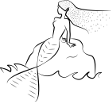to inseart link (or link to file) use C-c C-i
General info
Date: August 7-11 2023
Place: Copenhagen Denmark
Organized by: The Department of Biology and the Globe Institute, University of Copenhagen (Fernando Racimo, Anders Albrechtsen and Ida Moltke)
Price: Free for all PhD students at Danish universities. 200 Euro for all other students.
Includes: All teaching. Food and accommodation are NOT included in the course fee.
Contact and sign up: To signup please fill in the questionaere, for questions write to cphsummercourse@gmail.com
Credit and diploma The course is 5 ETCS credicts and you will recieve a diploma
Online option The course is also availeble online for students who cannot attend physically. It is free and you will recieve a diploma if you complete the course but no ETCS credits.
Boat trip
Information on how to get there instructions.pdf
Content
The course is a comprehensive introduction to a number of topics and common research tools used in analyses of next-generation sequencing (NGS) data. Topics include: genetic drift, natural selection, population structure, recent and ancient admixture, spatial genetics, f-statistics and demographic inference and simulations. We will cover the theoretical concepts but the main focus is practical use of the methods. Lectures will be combined with hands-on computer exercises.
Intended Learning Outcome
After the course the student should be able to:
- Use population genetic theory to infer basic population genetics characteristics from genetic data
- Be able to infer ancestry and population structure based on genetic data
- Use NGS data including low depth for population genetic inference.
- Select the optimal strategy for selection scans depending on the population genetics characteristics of the sample population, including taking population structure into account
- Interpret and discuss the results of own analyses and results in the scientific literature
Instructors
- Rute R. Fonseca, Associate Professor at Center for macroecolgy, University of Copenhagen, DK.
- Benjamin Peter, Group leader, Max Planck Institute for Evolutionary, Germany
- Shyam Gopalakrishnan Associate Professor, Globe Institute, University of Copenhagen, DK
- Fernando Racimo, Group leader, Globe Institute, University of Copenhagen, Denmark
- Anders Albrechtsen, Group leader, Department of Biology, University of Copenhagen, DK
- Ida Moltke, Group leader, Department of Biology, University of Copenhagen, DK
- Martin Petr, Post Doc, Globe Institute, University of Copenhagen, Denmark
Time and place
The course will take place from Monday August 7 to Friday August 11th 2023 at Biocenteret, Ole Maaloes Vej 5, 2200 Copenhagen N. All lectures and computer exercises will take place in room 4.0.24 (i.e. building 4, ground floor, room number 24). This includes research talks. You can enter the buiding from two sides as shown shown on this map.
Laptop
You should bring a laptop to the course. We will log into a remote server from the laptop so any laptop will do regardless of operating system.
Course material
The lecture will be based on a large amount of reading material (articles/notes) that should be read in advance - you can find them here once they are finalized (you will get an email with password). The slides used during the lectures will be made available right before the lectures.
Tenative Program (2023)
Monday - Introduction to population genetics and NGS data
- 09:00 - 09:15 Welcome (Ida Moltke)
- 09:15 - 10:15 Lecture 1: Introduction to basic population genetic terms and concepts (Fernando Racimo)
- 10:30 - 12:00 Computer exercises I
- 12:00 - 01:00 Lunch (on your own)
- 01:00 - 02:15 Lecture 2: Introduction to basic NGS data, Data processing, and formats (Rute Fonseca)
- 02:30 - 03:15 Computer exercises II
- 03:30 - 04:15 Research lecture by Rute Fonseca. Title: Searching for genomic signatures of early domestication in Maize
- 04:30 - 07:00 Reception/social mixer
Tuesday - Analysis of NGS data and population structure
- 09:00 - 10:15 Lecture 3: Estimation of allele frequencies, SNP calling and genotype calling from NGS data (Anders Albrechtsen)
- 10:30 - 12:00 Computer exercises III
- 12:00 - 01:00 Lunch (on your own)
- 01:00 - 02:15 Lecture 4: Inference of population structure (Ida Moltke)
- 02:30 - 04:00 Computer exercises IV
- 04:15 - 05:00 Research lecture by Rasmus heller, Title: Admixture between wild and domestic Asian bovines
- Canal boat trip
Wednesday - Population structure
- 09:00 - 10:15 Lecture 5: Inference of Population structure II(Anders Albrechtsen)
- 10:30 - 12:00 Computer exercises V
- 12:00 - 01:00 Lunch (on your own)
- 01:00 - 02:15 Lecture 6: D/f/F statistics (Ben Peter)
- 02:30 - 04:00 Computer exercises VI
- 04:15 - 05:00 Research lecture by Hannes Schroeder Title: Genomic perspectives on the early peopling of the Caribbean
Thursday – admixture graphs and selection
- 09:00 - 10:15 Lecture 7: Admixture graph (Ben Peter)
- 10:30 - 12:00 Computer exercises VII
- 12:00 - 01:00 Lunch (on your own)
- 01:00 - 02:15 Lecture 8: Detecting genomic regions under (positive) selection with NGS data (Rute Fonseca)
- 02:30 - 04:00 Computer exercises VIII
- 04:15 - 05:00 Research lecture by Benjamin Peter Title: Towards computational approaches to study non-discrete population structure
Friday - Demography and simulations
- 09:00 - 10:15 Lecture 9: Simulations in population genetics (Martin Petr)
- 10:30 - 12:00 Computer exercises IX
- 12:00 - 01:00 Lunch (on your own)
- 01:00 - 02:15 Lecture 10: Demography Inference( Shyam Gopalakrishnan)
- 02:30 - 04:00 Computer exercises X
- 04:15 - 05:00 Research lecture by Cindy Santander Title: Detecting epidemic-driven selection: a simulation-based approach to optimal sampling design and analysis strategies
- 05:00 - ? Farewell drinks
Evaluation
Participants who have participated actively in all parts of the course and completed all exercises satisfactorily will be awarded a certificate of completion at the end of the course. The work load corresponds to 5 ECTS points. Note that this workload includes one week of preparation. Reading material for this is available in the above course program. The online participants of the course will not recieve the ECTS points but will still recieve a diploma.
